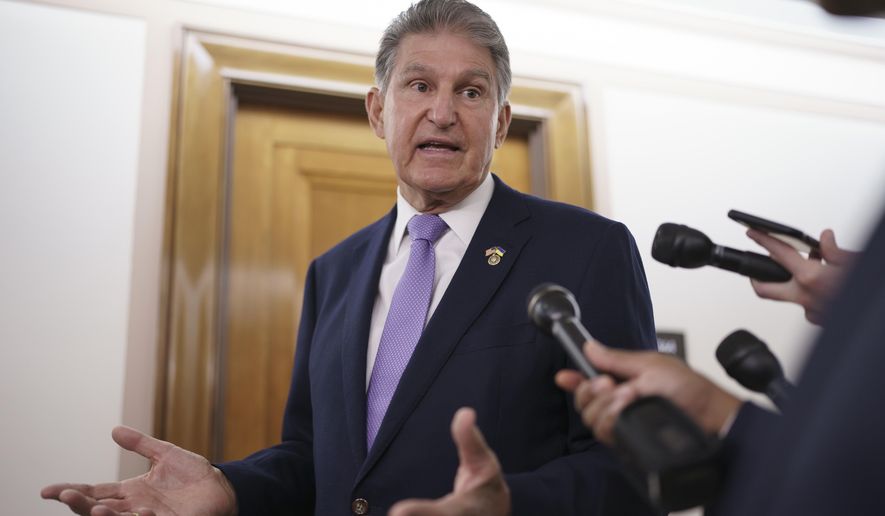Sen. Joe Manchin III on Wednesday announced that he had reached a deal with Senate Majority Leader Charles E. Schumer on a party-line bill to raise taxes and spend on climate change and health care programs.
The talks between the two Democrats were believed to have died weeks ago when Mr. Manchin, from the coal- and natural gas-producing state of West Virginia, said he would not support climate and energy provisions after months of negotiations because of inflation concerns.
The deal announced Wednesday mirrors what Mr. Manchin said he would not support, including increased taxes on large corporations and wealthy individuals.
His office rejected the characterization that the deal marked a reversal.
“Last week @Sen_JoeManchin repeatedly said he wasn’t walking away from the table and he understood the importance of these negotiations,” Manchin spokesperson Sam Runyon tweeted. “Today’s announcement is not a reversal of anything.”
The legislation, which Senate Democrats plan to pass in a party-line vote next week, would be a long-sought win for Mr. Biden. Most of his agenda went down in flames because of Mr. Manchin’s opposition to tax-and-spend bills, including Mr. Biden’s roughly $2 trillion social welfare and climate bill known as Build Back Better.
SEE ALSO: Hundreds of climate activists vow to ‘disrupt’ lawmakers’ annual charity baseball game
“Build Back Better is dead, and instead we have the opportunity to make our country stronger by bringing Americans together,” Mr. Manchin said in a lengthy statement.
Solid Republican opposition to the bill is guaranteed, and Republican lawmakers scoffed at Mr. Manchin’s change of heart.
“Senate Democrats can change the name of Build Back Broke as many times as they want. It won’t be any less devastating to American families and small businesses,” said Sen. John Cornyn of Texas. “Raising taxes on job creators, crushing energy producers with new regulations and stifling innovators looking for new cures will only make this recession worse, not better.”
In a joint statement, Mr. Manchin and Mr. Schumer said the deal would include $300 billion in deficit reduction and nearly $370 billion for energy and climate programs over the next decade. Specifics about the programs were limited, but clean energy tax credits and funding for energy projects are expected to be included. They estimated that the clean energy provisions would reduce carbon dioxide emissions, which contribute to climate change, by 40% by 2030.
Subsidies for the Affordable Care Act, or Obamacare, would be expanded through 2025. The legislation also would allow Medicare to negotiate for prescription drugs in a bid to lower medical costs.
The spending would be fully funded by closing tax loopholes on wealthy individuals and corporations, Mr. Schumer and Mr. Manchin said.
As a condition of approval, Mr. Manchin, President Biden, House Speaker Nancy Pelosi and Mr. Schumer reached an agreement to pass “comprehensive permitting reform legislation” for energy projects before the end of September.
That would mark a major concession from Democrats, who want to move away from fossil fuels that permitting reform would largely benefit. The energy industry, particularly oil and natural gas companies, has long called for cutting bureaucratic red tape.
“This bill will cut the inflation taxes Americans are paying, lower the cost of health insurance and prescription drugs, and ensure our country invests in the energy security and climate change solutions we need,” Mr. Manchin said.
The White House endorsed the agreement, touted its provisions and urged Congress to swiftly pass it.
“This is the action the American people have been waiting for,” Mr. Biden said in a statement. “This addresses the problems of today – high health care costs and overall inflation – as well as investments in our energy security for the future.”
The senators announced the breakthrough 10 days before their August vacation. Assuming the chamber’s parliamentarian determines that all of the provisions adhere to a strict rule governing the budget reconciliation process, Senate Democrats will pass it next week before jetting out of town.
Democratic climate hawks were surprised by the agreement but expressed cautious optimism that the legislation might finally cross the finish line. They still want more information about the provisions.
“I have to see the details, but I’m optimistic about it. I’m optimistic that climate is in there,” said Rep. Ro Khanna, California Democrat.
The bill, dubbed the Inflation Reduction Act of 2022, would reduce greenhouse gas emissions while including money for “all fuel types,” including hydrogen, nuclear, renewables, fossil fuels and energy storage.
“This legislation ensures that the market will take the lead, rather than aspirational political agendas or unrealistic goals, in the energy transition that has been ongoing in our country,” Mr. Manchin said. “It is truly all of the above, which means this bill does not arbitrarily shut off our abundant fossil fuels.”
• Ramsey Touchberry can be reached at rtouchberry@washingtontimes.com.




Please read our comment policy before commenting.